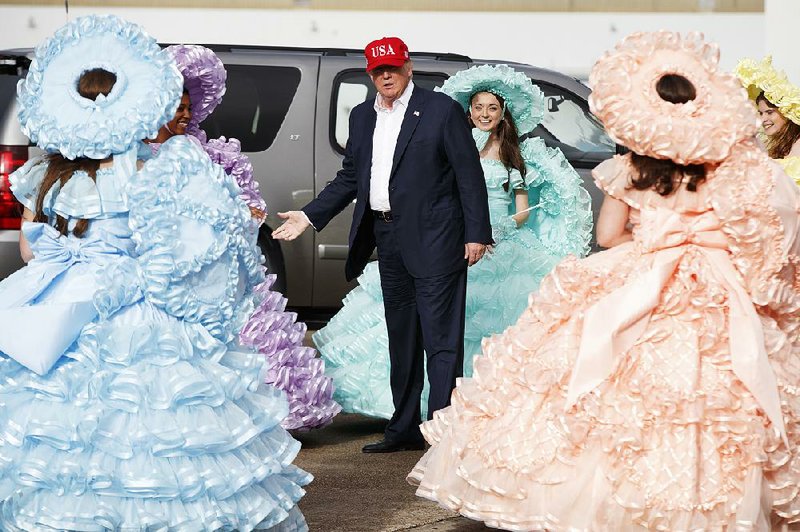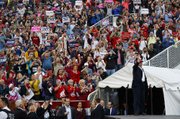MOBILE, Ala. -- President-elect Donald Trump on Saturday wrapped up his postelection victory tour by signaling a desire to return to the road as the nation's chief executive.
Trump struck a somber note as his rally in Mobile, Ala., drew to a close. "Now, in a certain way, the hard work begins," he said, only to suggest minutes later that he may return again to the stage, and soon.
"This is the last time I'm speaking at a rally for maybe a while, you know?" he told the crowd. "They're saying as president, he shouldn't be doing rallies, but I think we should, right? We've done everything else the opposite. This is the way you get an honest word out."
Within days of defeating Democrat Hillary Clinton, Trump suggested to aides that he resume his campaign-style barnstorming. Though he agreed to hold off until he assembled part of his Cabinet, Trump has spoken of his fondness for being on the road. Aides are considering more rallies after he takes office, to help press his agenda with the public.
[TRUMP: Timeline of president-elect’s career + list of appointments so far]
The raucous rallies, a hallmark of his campaign, were meant to salute supporters who lifted him to the presidency. But the appearances also have been his primary form of communication since the Nov. 8 election.
Trump has eschewed the traditional news conference held by a president-elect within days of winning. He's done few interviews, announces his Cabinet picks via news releases and continues to rely on Twitter to broadcast his thoughts and make public pronouncements.
That continued Saturday morning, when Trump turned to social media to weigh in on China's seizure of a U.S. Navy research drone from international waters, tweeting, "China steals United States Navy research drone in international waters - rips it out of water and takes it to China in unprecedented act."
His first tweet referred to an "unpresidented" act, but he later corrected it. China said Saturday that it intended to return the drone to the U.S.
At the Mobile rally, Trump saluted his supporters -- gathered at the same football stadium that hosted the biggest rally of his campaign -- as true "patriots."
"We are really the people who love this country," Trump said.
He reminisced about his campaign announcement and his ride down Trump Tower's golden escalator. He disputed a newspaper's account of the size of the crowd at one of his rallies and called the press dishonest.
Trump also paid homage to the August 2015 rally in Mobile that he said jump-started his campaign. Though the crowd Saturday was not as large, it was no less fervid, repeatedly chanting "Build the wall!" when Trump renewed his vow to build an impenetrable wall at the Mexican border.
"We're thanking the people of Alabama and we're thanking the people of the South because, boy, did we do well," said Trump, who remained undeterred when it began to rain on the stadium. "We'll stay out here. To hell with this suit. I never liked this suit anyway."
Trump invited his nominee for attorney general, Sen. Jeff Sessions of Alabama, onstage to receive cheers from his hometown crowd. When Trump's plane landed, he received a water cannon salute from a pair of firetrucks and was then greeted by several Azalea Trail Maids, women dressed in antebellum Southern belle outfits.
Trump, in remarks made on his victory tour, at times sounded less than eager to bridge the divide between his supporters and opponents.
At his Pennsylvania rally, for example, Trump thanked blacks who didn't vote, saying: "They didn't come out to vote for Hillary. They didn't come out. And that was a big -- so thank you to the African-American community."
But in North Carolina, he said: "We will heal our divisions and unify our country. When Americans are unified, there is nothing we cannot do -- nothing!"
And in Mobile, he ended with a plea for all Americans, including those who did not support him, to "never give up."
Budget-office pick
Earlier Saturday, Trump announced the nomination of U.S. Rep. Mick Mulvaney of South Carolina to lead the Office of Management and Budget.
Trump said in a statement that with Mulvaney, a fiscal conservative with no experience assembling a government spending plan, heading the office, his government would do "great things for the American people."
"Right now we are nearly $20 trillion in debt, but Mick is a very high-energy leader with deep convictions for how to responsibly manage our nation's finances and save our country from drowning in red ink," Trump said in the statement.
Mulvaney, 49, was elected to Congress in 2010 in the wave that sent a cohort of younger, staunchly conservative members into the House. Mulvaney quickly staked out ground as one of Congress' most outspoken fiscal conservatives -- playing a key role in the 2011 showdown between President Barack Obama and House Republicans that ended in the passage of strict budget caps.
He has been an advocate for spending cuts, often taking on his own party to push for more aggressive curbs to government spending.
Trump has announced plans for increased defense spending in a large infrastructure bill. Adding Mulvaney to his administration could help ease concerns from fiscal conservatives about the cost of such plans and their effect on the deficit.
A founding member of the House Freedom Caucus, a group of about three dozen conservative lawmakers that has used its leverage to push Republican leaders to the right, Mulvaney was among the lawmakers who were thought to have pushed House Speaker John Boehner, R-Ohio, out of power in 2015.
Mulvaney particularly has broken with members of his party on defense-spending issues. He has been a fierce critic of the use of a separate war-funding stream known as overseas contingency operations, a budgetary maneuver used to skirt spending caps and fund military and anti-terror operations abroad. He has allied himself with Democrats at times to try to force defense-spending cuts.
Mulvaney is also an advocate of a balanced-budget amendment to the Constitution.
Mulvaney has had largely friendly relations with Boehner's successor, Paul Ryan, R-Wis. Mulvaney was among three members who offered nominating speeches for Ryan in the House GOP leadership election last month.
In a statement, Ryan praised Mulvaney's appointment to head the budget office.
"Mick Mulvaney is the absolute right choice," Ryan said. "In Congress, he has been a conservative reformer from day one, proposing solutions to fix the budget process and our regulatory system."
The position requires Senate confirmation.
Democrats' strategy
Democrats have their eyes on the Senate confirmation hearings, such as the one for Steven Mnuchin, Trump's Treasury Department pick, as a prime opportunity to chip away at the president-elect's appeal with working-class voters and begin rebuilding their own party's economic message.
Given the narrow GOP majority in the Senate, Mnuchin is likely to be confirmed. But Democrats plan to grill the former Goldman Sachs executive over his Wall Street ties and his stake in a bank that profited from the foreclosure crisis. Several people who lost their homes are seeking to testify in the confirmation hearings.
Some Republicans are privately questioning Mnuchin's readiness to face aggressive questioning by senators. He has no government background, and his media appearances immediately after being picked raised alarms about his political inexperience.
Some of the president-elect's advisers were caught off guard by the bold promises Mnuchin made to reporters after the announcement, including pledging the largest tax cut since President Ronald Reagan in the 1980s, as well as economic growth of up to 4 percent.
As of Friday, Mnuchin had not yet turned in vetting materials, including three years of tax returns and other financial information, to the senators who will be initially weighing his nomination.
To some Democrats, Mnuchin is an even bigger target than Trump's State Department pick, Rex Tillerson, who forged close ties with Russia during his long career at Exxon Mobil. While Democrats are eager to question Trump's own connections to Russia, their ability to discredit his populist appeal is more central to the party's postelection rebuilding efforts.
"Is Mr. Mnuchin, a former longtime executive at Goldman Sachs, really going to re-establish Glass-Steagall and control Wall Street greed and illegal behavior? I doubt it," Sen. Bernie Sanders, I-Vt., said in a preview of some of the issues he and Democrats plan to raise in the confirmation hearings.
Sen. Elizabeth Warren, D-Mass., compared Mnuchin to "someone out of a bad movie for what went wrong on Wall Street."
Mnuchin, a multimillionaire, is one of several wealthy individuals from the private sector tapped for jobs in the new Cabinet. He spent nearly two decades at Goldman Sachs before creating his own hedge fund and financing Hollywood movies. Mnuchin then served as Trump's campaign finance chairman.
Tom Korologos, a former U.S. ambassador who has been through Senate confirmation hearings, said wealthy, politically inexperienced Cabinet nominees can find the "arcane art" of the confirmation process a challenge.
"They may not be used to taking criticism, answering uncomfortable questions. They may feel that since the president picked them, why should the Senate get to second-guess?" he said.
"But that's not how our system works. There is nothing like the confirmation process."
Information for this article was contributed by Jonathan Lemire, Julie Pace and Julie Bykowicz of The Associated Press; by Abby Phillip of The Washington Post; and by Nick Corasaniti of The New York Times.
A Section on 12/18/2016


